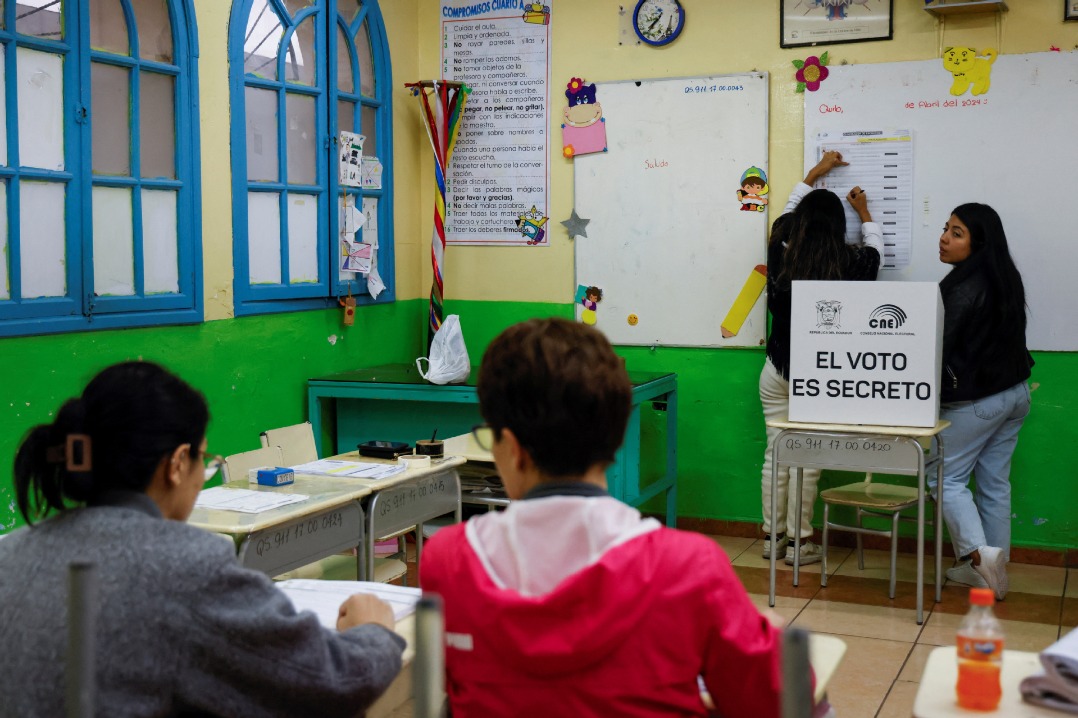Time for G7 to stop polarizing the world


Labeling China and Russia as "autocracies" and the United States and some allies as "democracies" has gained a foothold in Western media's coverage of the Group of Seven summit, echoed by a claim of "free open societies and democracies" in the 2021 G7 Leaders' communique.
Such categorization, instead of recognizing China as the world's largest and most substantial democracy, disregards history, denies facts and is in itself undemocratic.
Such a description of free democracies goes against historical truth.
The proposal of Soviet-led nations to replace "democratic societies" with "democratic states "in the 1948 draft, by a committee of the United Nations Commission on Human Rights, of the Universal Declaration of Human Rights was rejected by Western countries because the US and the United Kingdom were deemed "democratic societies", while socialist countries were "democratic states".
Part of the reason is that socialist countries take public ownership, and US-lauded universal suffrage progressed slowly. Universal suffrage was not implemented in the last of the UK's territories until 1968. The US did not achieve complete universal suffrage until 1965.
In addition, throughout US and UK history, winners of presidential or parliamentary elections have ridden an absolute minority of eligible voters.
Joe Biden collected 306 Electoral College votes to claim the US presidency after winning more than 81 million votes in the election-the highest number in US history. Yet that number was 51.3 percent of the ballots, or roughly one-third of the around 239.2 million eligible US voters in 2020, according to the US Elections Project.
In comparison, Russian President Vladimir Putin won 76.69 percent of the votes in the 2018 direct presidential election, with a turnout rate of 67 percent.
In China, Xi Jinping was overwhelmingly elected president of the country at the first plenary session of the 12th National People's Congress in 2013. The Communist Party of China had gone through a long process that saw 59 inspection groups working for a year across the country in finalizing 727 candidates for members and alternate members of the CPC Central Committee before electing him as general secretary of the CPC Central Committee in November 2012 at the CPC's 18th National Congress.
Unlike G7 leaders who struggle for approval ratings, the Chinese leadership with Xi at its core has enjoyed a "very high favorability rate" in years of surveys conducted by US agencies such as the Pew Research Center or Harvard University's Ash Center.
Literally, democracy is rule by the people, as Sterling Professor Emeritus Robert A. Dahl of Yale University has declared in the online Britannica. He then raises seven fundamental questions of its principles, including the appropriate unit or association, what constitutes a majority, and how citizens govern.
For each of the answers, the Chinese democratic system is doing well. The association is the people's congress at national, provincial, city and county levels, whose deputies are elected by voters directly at the basic level and indirectly at upper levels, supplemented by people's political consultative conferences where public decisions are discussed beforehand.
China is run by people and the leadership serves the people. The Chinese democratic system features direct and indirect voting, and democratic proceedings during decision-making, management of public affairs and supervision over all public servants. In practice, the vast majority of farmers, workers, soldiers, academics, businesspeople and students interact freely with their representatives, political advisers and officials in decision-making, execution and review of policies.
The all-procedure and comprehensive Chinese democracy not only combines Western election merits, but displays special characteristics for intensive consultation and democratic centralism, which makes it distinctly effective in governance.
Judging from Britannica's standards, the US again performs unsatisfactorily in citizens' governing and a proper majority at least, while China should be credited as the world's largest democracy, and the most substantial of its kind.
It is high time for the world to acknowledge this simple truth.
Critics in the West may argue that the Chinese supreme power does not engage in "freely contested" elections as in the US. Yet no election in the US can be free from the influence of money.
Worse, many of their voters often find no satisfactory candidates available and must choose between the bad and the worse and not so "freely".
In fact, democracy in our world assumes diversified forms, just as the UK and the US have different systems. China has been seeking democracy and improving its own democratic system since the CPC's birth in 1921, and saw the copying of US democratic formulas fail tragically before shaping its own.
If democracy within a nation is to respect one's choice of a national leader or representatives, democracy among nations should prioritize respect for each nation-state's own development path as chosen by its peoples.
Thus the polarization of so-called democracies and autocracies only serves as an invidious excuse to create enemies in order for the US to maintain its military and economic dominance over others, its allies included.
A silver lining from the G7 is its wish "to secure a cleaner, greener, freer, fairer and safer future for our people and planet", as stated in the leaders' communique. One small step toward that goal would be for the G7 and the Western media to stop dividing the world into "democracies" and "autocracies "and treat China and Russia as equal democratic nation-states within the United Nations framework.
The author is a journalist with China Daily.


































